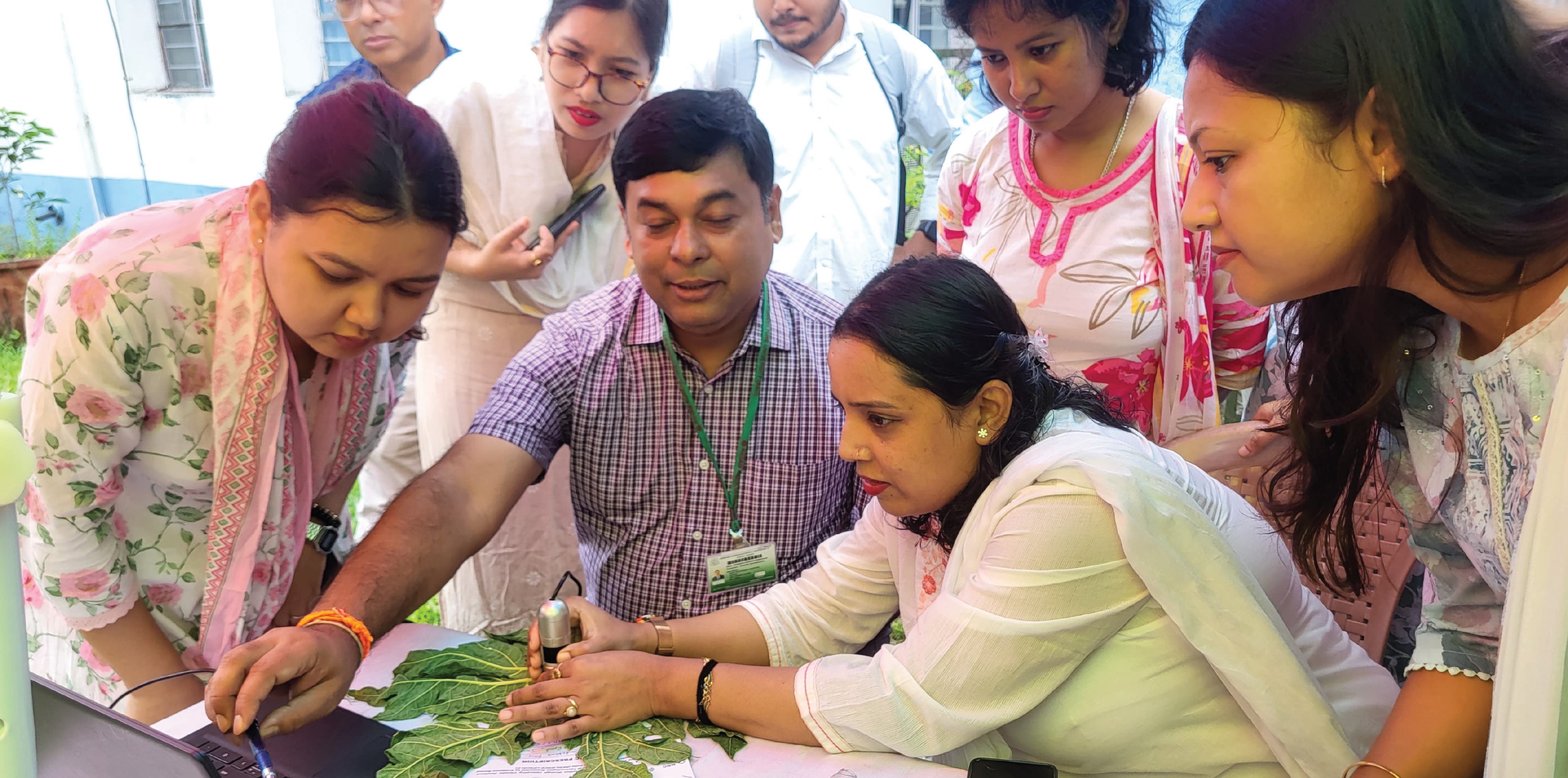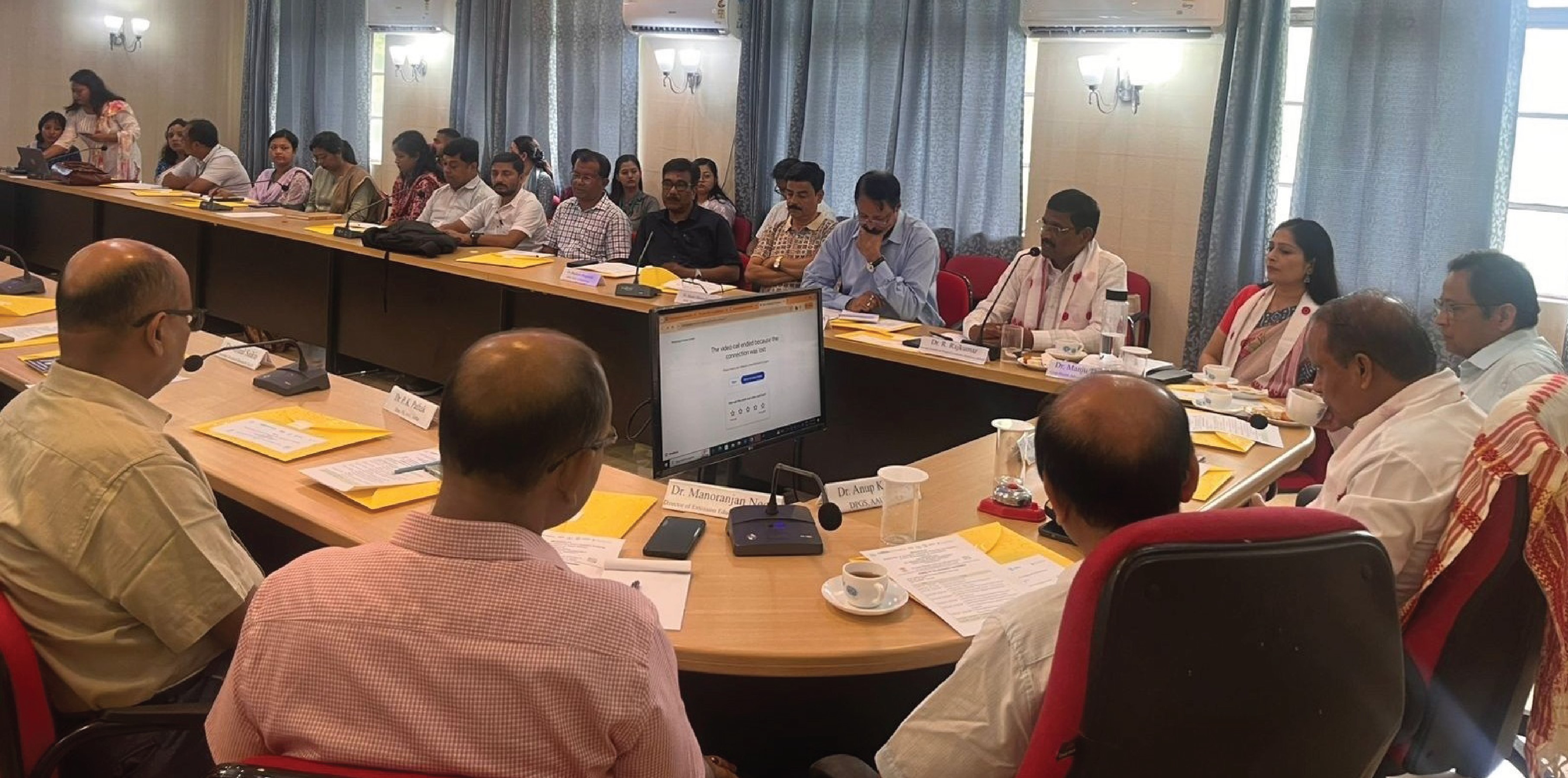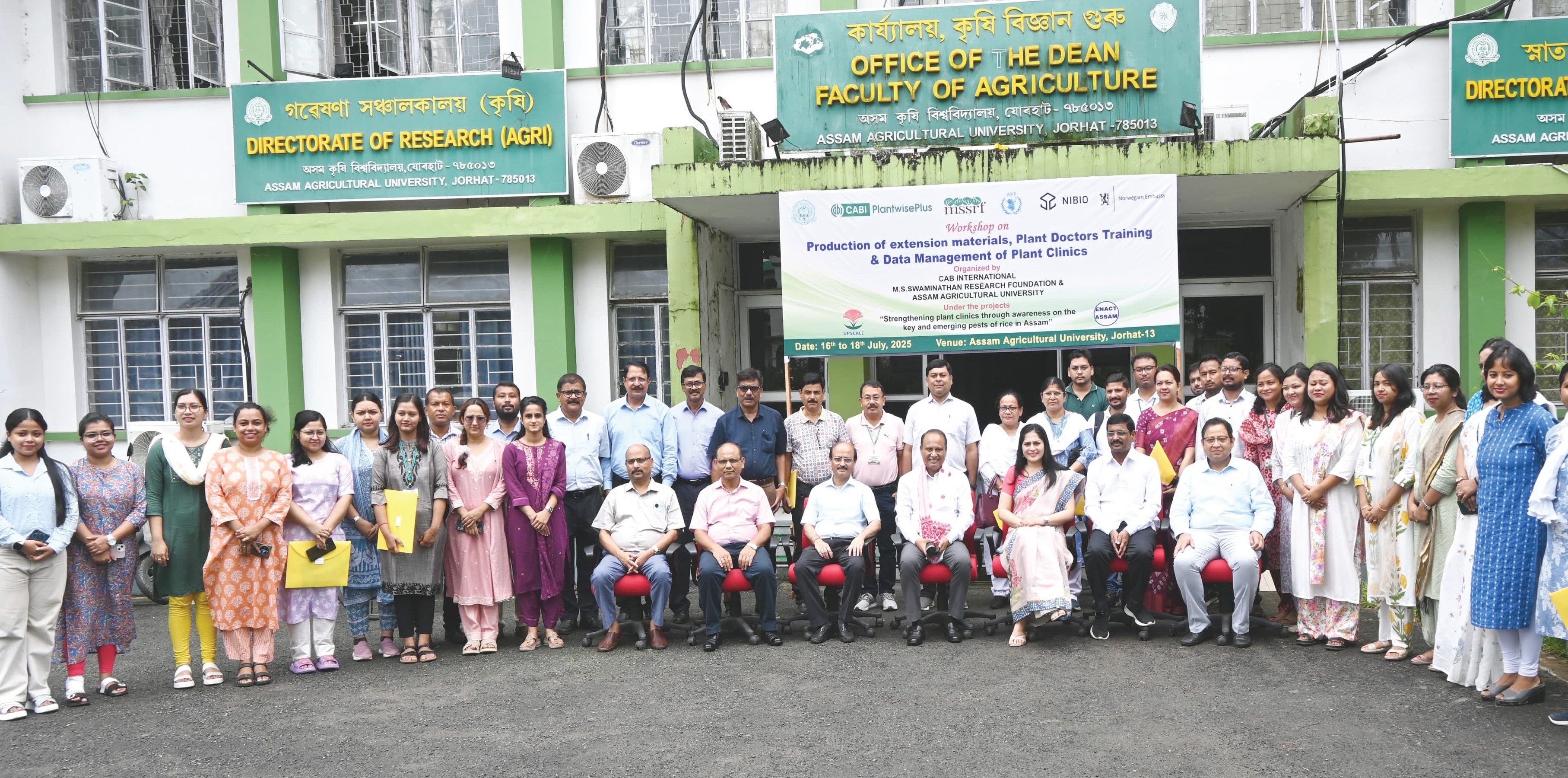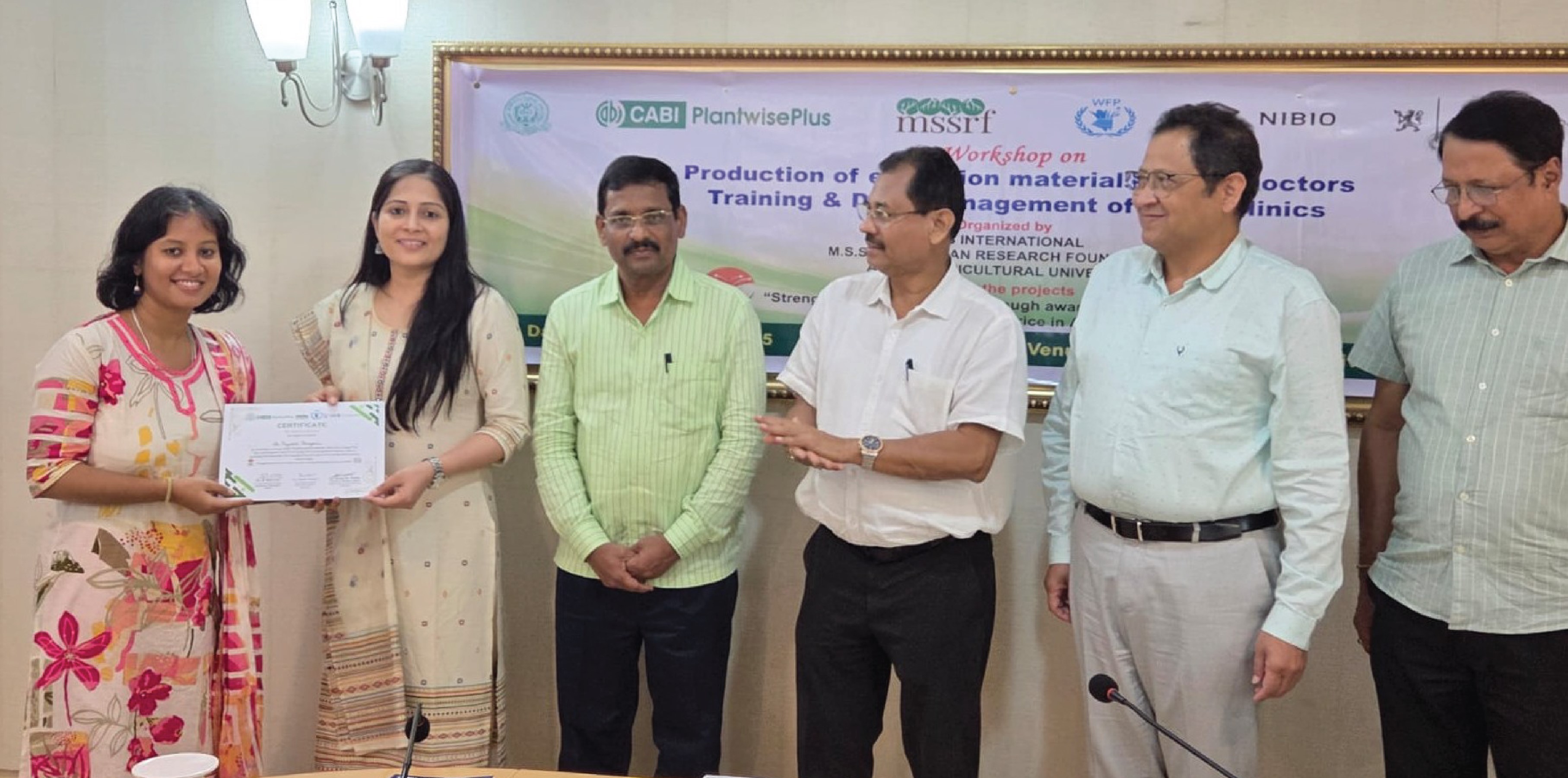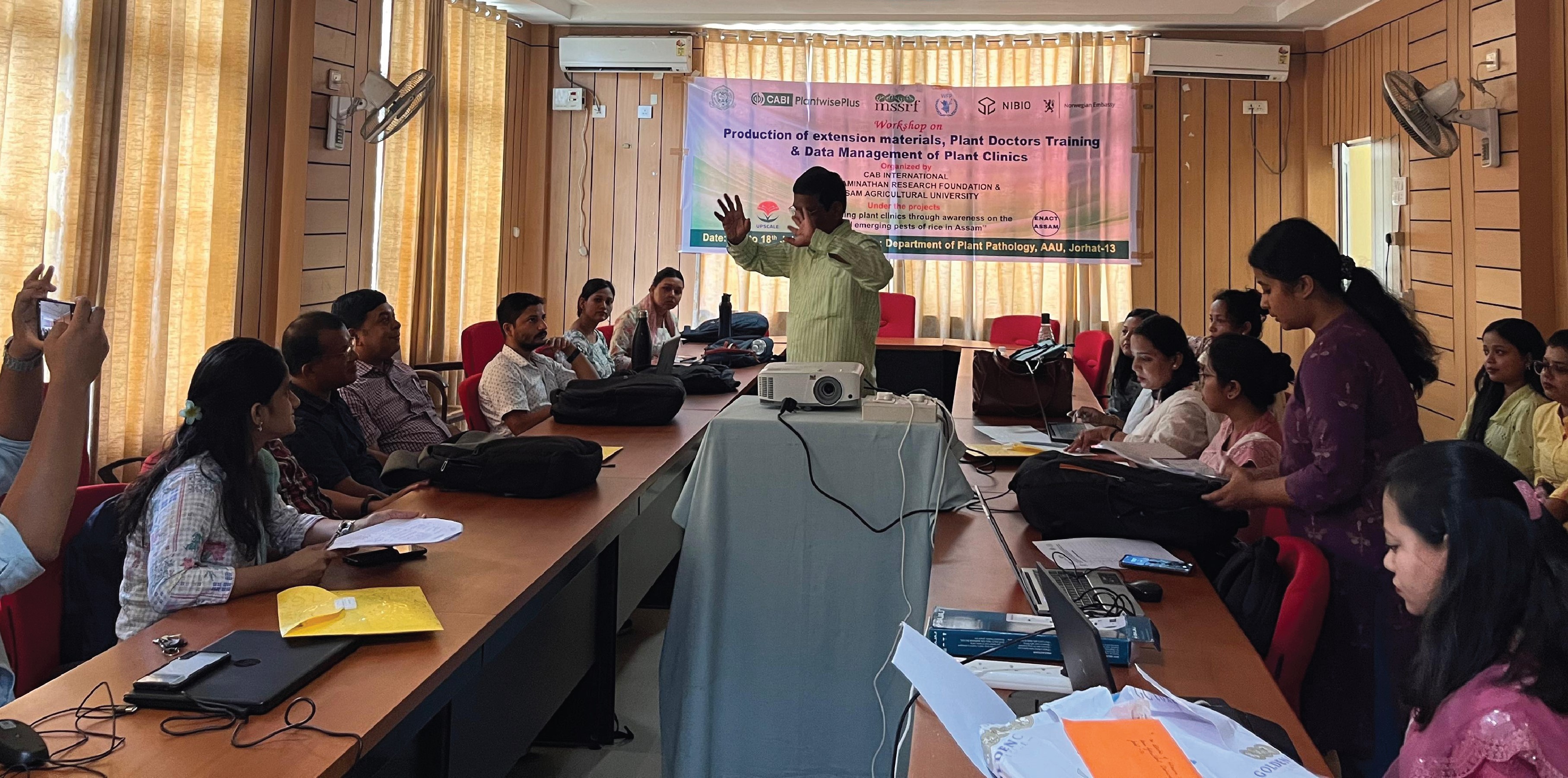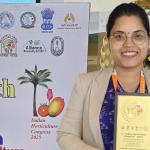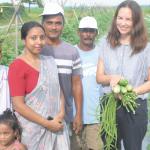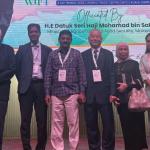Weeklong workshop on Production of Extension Materials, Plant Doctors Training & Plant Clinic Data Management
From 16th –19th July 2025, a weeklong workshop on Production of Extension Materials, Plant Doctors Training & Plant Clinic Data Management was held at Assam Agricultural University (AAU), Jorhat. This collaborative initiative was jointly organized by CAB International (CABI), M. S. Swaminathan Research Foundation (MSSRF), and Assam Agricultural University (AAU).
Inaugural Session & Write-shop on Extension Material Development
The workshop opened with an inaugural ceremony graced by the Honourable Vice Chancellor of AAU, Dr. Bidyut Chandan Deka, who was the Chief Guest in the inaugural programme in the presence of Dr. Sanjay Kumar Chetia, Director of Research, Technical sessions were conducted by Dr. Manju Thakur, Crop Health Advisor at CAB International; Dr. R. Rajkumar, Principal Scientist & Coordinator at MSSRF; and Dr. Parinda Baruah, Scientist (Plant Pathology) at ARRI-Titabar, AAU. Technical sessions were led by Dr. Manju Thakur (CABI), Dr. R. Rajkumar (MSSRF), and Dr. Parinda Baruah (AAU).
- Participants were trained to develop targeted extension materials, known as factsheets, tailored for agricultural extension personnel, using the Snowman Model and Pest Management Decision Guides (PMDGs). A group exercise resulted in 18 factsheets on key and emerging pest/disease issues and climate-smart technologies.
- Once validated, these will be published on CABI’s portal for national and global circulation.
Plant Doctors Training
About Plant Doctors
Plant doctors—trained agricultural extension workers—play a vital role in helping farmers manage plant pests and diseases. They provide science-based, practical advice that enables farmers to protect their crops, reduce losses, and improve productivity. By bridging the gap between research and farming communities, plant doctors ensure that solutions to plant health problems are accessible, timely, and sustainable.
Training Overview
The training, facilitated by resource persons, Dr. Manju Thakur (CAB International), Dr. R. Rajkumar, M. S. Swaminathan Research Foundation (MSSRF) provided participants with a comprehensive understanding of the Plant Health System (PHS) and the Plantwise programme, a global CABI-led initiative to strengthen plant health services.
Key Topics Covered
- Diagnosis Skills: Recognizing biotic (pest and disease) and abiotic (environmental and nutrient-related) symptoms.
- Integrated Pest Management (IPM): Principles and practices for sustainable pest control, emphasizing non-chemical measures such as biopesticides and biocontrol interventions over hazardous pesticides.
- Digital Tools: Use of the Plantwise Knowledge Bank, Plantwise Data Collection App with electronic prescription sheets, and the Plantwise Diagnostic Field Guide for evidence-based recommendations.
- Field Exposure: Demonstration plant clinics to understand real-world farmer challenges, build trust, and practice sample-based diagnosis.
- Technology in Diagnosis: Application of portable USB microscopes to help farmers see pest damage directly and to capture images for expert consultation when needed.
Practical Learning
Hands-on sessions at demonstration plant clinics allowed trainees to:
- Interact directly with farmers
- Diagnose crop problems on-site.
- Provide targeted advice on management practices and sourcing appropriate inputs.
Impact
The training instilled confidence and motivation among the participants to expand the network of plant clinics, strengthening local capacity for early pest detection and sustainable crop management. By equipping new plant doctors with technical knowledge, diagnostic skills, and access to global plant health resources, the programme contributes directly to reducing crop losses and enhancing food security in Assam.
This session directly supported the PlantwisePlus and Upscale project goals of enhancing advisory service providers’ diagnostic and recommendation capacity.
________________________________________
Day 3 – Plant Clinic Data Management
The aim of this workshop was to create new plant clinic codes and train the plant doctors to digitize the plant clinic data that would be available for real time analysis via CABI-POMS system.
During this training, the newly trained plant doctors’ were provided hands-on training in Plantwise data collection and management tools:
- Mobile and desktop applications for plant clinic record-keeping.
- Data Management: Introduction to the Plantwise Online Management System (POMS) for harmonizing, storing, and analyzing plant clinic data.
- Demonstration of the Plantwise Online Management System (POMS) for harmonizing and analyzing pest data.
Plant clinic data management, supported by the CABI’s Plantwise Online Management System (POMS), is crucial for transforming individual farmer consultations into a coordinated plant health surveillance network. By systematically recording diagnoses and recommendations, POMS enables tracking of pest and disease trends, providing early warnings for emerging threats and guiding rapid, targeted responses.
The workshops concluded with a valedictory session attended by senior AAU officials, where participation certificates were distributed.
19 July 2025 – Plant Health Campaign
A field-based Plant Health Campaign on Key and Emerging Pests of Rice was organized at Thengal Gaon, Jorhat.
Plant Health Campaign on Key and Emerging Pests of Rice – Empowering Farmers with Timely Knowledge
On 19 July 2025, a Plant Health Campaign was held at Thengal Gaon, Jorhat district, as part of the integrated efforts under the ENACT Assam, UPSCALE, and PlantwisePlus projects to strengthen rice farming resilience in Assam. The campaign aimed to raise awareness among farmers about the identification, prevention, and sustainable management of both key and emerging rice pests that threaten yields and food security in the region.
The event brought together a team of experts, including Dr. Manju Thakur (CABI), Dr. R. Rajkumar (MSSRF), Dr. Palash Deb Nath, Head Department of Pathology, AAU, Dr. Parinda Baruah (AAU), Dr. Milon Jyoti Konwar (DoR-Agri, AAU), Dr. Pranjal Kaman (AICRP, AAU), and Dr. Priyakshi Buragohain (AAU-ZRS Shillongani). Through technical talks and visual demonstrations, they shared science-based, field-tested pest management strategies, with a strong focus on Integrated Pest Management (IPM) and the use of low-risk, nature-positive solutions.
A major highlight was the on-farm demonstration of plant clinics and a mobile plant clinic service, which allowed farmers to bring pest-affected crop samples for immediate diagnosis. Trained plant doctors examined the samples using portable diagnostic tools, provided tailored recommendations, and advised on where to source necessary inputs. Farmers were encouraged to adopt preventive measures such as timely field monitoring, use of resistant rice varieties, and environmentally friendly control methods.
The campaign attracted 37 farmers, from nearby 5 villages who actively engaged with the experts, asked questions, and shared their own field experiences. Many expressed a shift in mindset—preferring to seek expert advice from plant doctors rather than relying solely on chemical dealers for pest solutions. This change reflects that such initiatives could shift farmers’ trust in science-based advisory services and the role of plant clinics in building farmer confidence, crop health, and community resilience.
Impact & Collaboration
This workshop and campaign showcased how multi-stakeholder partnerships—linking international agencies, state institutions, and local experts—can address pest threats, climate resilience, and farmer advisory needs in a unified manner.

